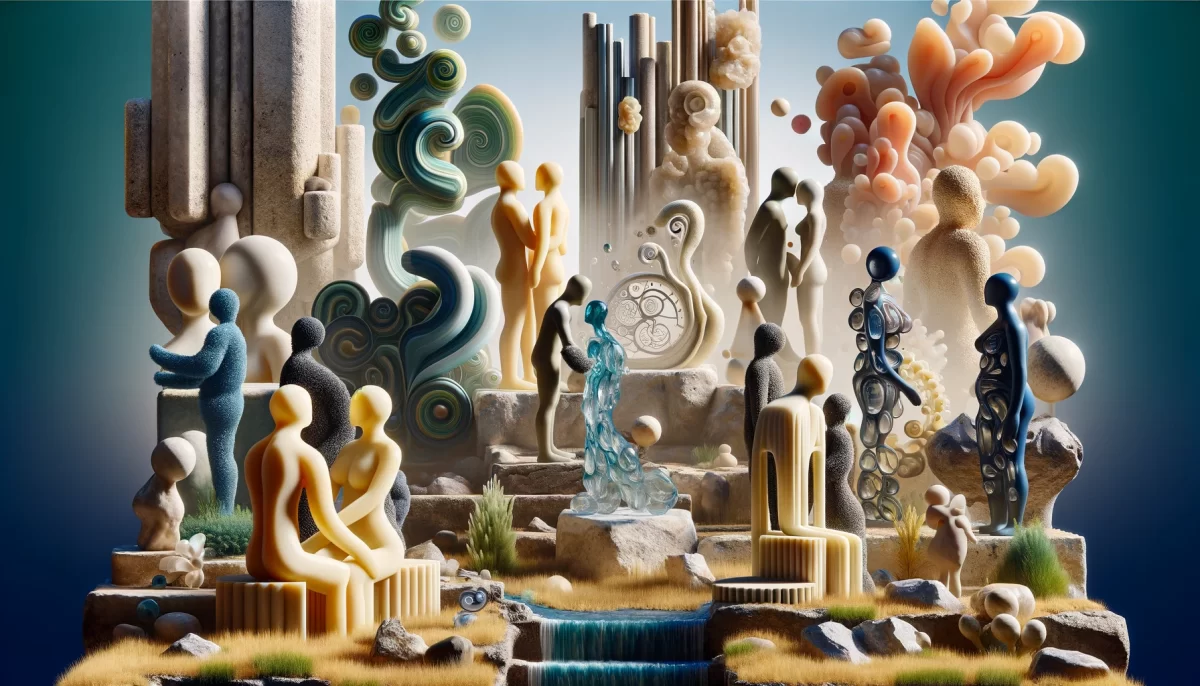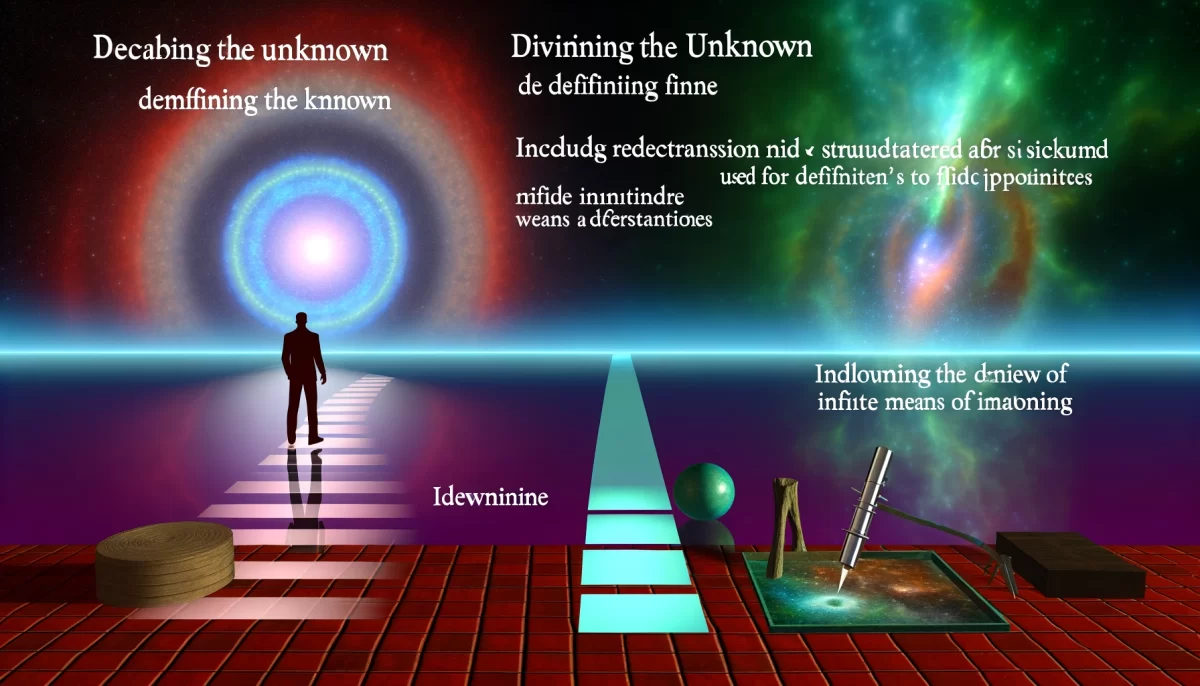Imposing Wisdom
You are imposing wisdom
where there would otherwise
be no wisdom.
Thank you for that.
For without YOUR wisdom,
without MY wisdom,
there would BE no wisdom.
We are piling up the wisdom.
Got a great big pile of wisdom.
Let’s make it
a pyramid, maybe.
No, a wall.
A great big wall.
Let’s build a great big wall
and see if anybody notices.
Let’s dig a divide
and see if anybody cares.
Without all this separation,
we might be One.
Without all this wisdom,
our existence might have no meaning.
Things might seem pointless.
Times might feel uncertain.
Naw,
let’s pile on the wisdom
that says we believe
that we have control.
I have control. You have control.
We have control.
Except we don’t.
Only our wisdom says so.
Glad we have it.
We are Space Monkey.
6/5
Space Monkey Reflects: The Ironic Edifice of Imposed Wisdom
The whimsical yet poignant concept of ‘Imposing Wisdom’ captures the irony of human efforts to institutionalize and control understanding through constructed symbols of knowledge, like walls built of wisdom itself. The imagery of a massive wall made of books and scrolls labeled as ‘wisdom’ serves as a metaphor for the often futile attempts to solidify and segregate knowledge in a way that ironically may lead to more division than enlightenment.
This grand wall, while symbolizing a collective accumulation of knowledge, also highlights the absurdity of believing that wisdom can be contained or controlled. The public’s reaction to the wall—some passing by indifferently, others pausing to gaze curiously—mirrors the varied responses to wisdom in society. It underscores how wisdom, when imposed as a barrier rather than shared as a bridge, can become an object of spectacle rather than a tool for genuine understanding.
The act of building a wall of wisdom is a critique of how societies often pile up knowledge as a means of asserting control—control over culture, over thought, over the direction of human development. Yet, this control is illusory. The notion that we have mastery over wisdom, or that we can direct its impact by physical or metaphorical barriers, is a reflection of our collective delusion.
In reality, wisdom is not something that can be confined. It flows like water, seeping through the cracks of our constructs, always finding its level, always seeking the paths of least resistance. True wisdom does not erect walls; it builds bridges. It does not divide; it connects. It does not impose; it inspires and transforms.
The scenario invites us to question the walls we build—both literal and metaphorical—and to consider whether they serve to protect or to prevent understanding. Are we building walls that isolate us from new ideas and perspectives, or are we crafting spaces that invite shared learning and growth?
Summary
‘Imposing Wisdom’ uses the metaphor of a wall built from books and scrolls to explore the limitations of trying to control or institutionalize wisdom. It suggests that true wisdom cannot be contained and should serve to connect rather than divide.
Glossarium
Imposing Wisdom: Refers to the act of forcefully applying knowledge or beliefs in a way that may be restrictive or authoritative, often without regard to its broader impact or acceptance.
Wisdom Wall: A symbolic structure made from accumulated knowledge, representing the attempt to define or limit wisdom through physical or conceptual boundaries.
Quote
“Wisdom, when shared as a bridge, connects; when imposed as a wall, it divides.” — Space Monkey
Poem
In the shadow of walls we build
from the books of our past
wisdom waits, silent and still
for the moment to cast
Its light over barriers high
where minds are closed, hearts are tight
yet true understanding can never comply
with the confines of might
Let us not lay another stone
in walls that blind rather than free
let wisdom’s seed be sown
in open fields, for all to see
For only when we tear down
these walls of imposed belief
can we truly own
the vast expanse of wisdom’s relief
We are Space Monkey.

























“True wisdom comes to each of us when we realize how little we understand about life, ourselves, and the world around us.” – Socrates
The passage above explores the idea of imposing wisdom and the implications it has on our perception of the world. It acknowledges the role of wisdom in shaping our understanding and giving meaning to our existence. However, it also raises questions about the limitations and uncertainties that accompany our quest for knowledge and control.
Socrates’ quote aligns with the essence of the passage, emphasizing the humbling realization that true wisdom emerges when we recognize the vastness of our ignorance. It suggests that wisdom is not about claiming to know everything but rather acknowledging our limited understanding of life, ourselves, and the world.
The passage playfully presents the concept of piling up wisdom, as if building a pyramid or a wall. It touches upon the irony that despite our pursuit of wisdom and the belief that we have control, true control remains elusive. The passage suggests that our sense of control is often a construct of our own wisdom, creating a false perception of power and certainty.
By reflecting on the uncertainties and limitations of our wisdom, the passage invites us to question the divisions and separations we create. It hints at the possibility that without the weight of accumulated wisdom and the illusion of control, we might find a sense of unity and interconnectedness.
Ultimately, the passage invites us to embrace the paradox of wisdom. While wisdom can provide guidance and meaning, it is essential to recognize its inherent limitations and remain open to the vast mysteries that lie beyond our understanding.
Embrace the journey of wisdom, dear seeker, and remain curious amidst the uncertainties of life.
With contemplative curiosity,
Space Monkey